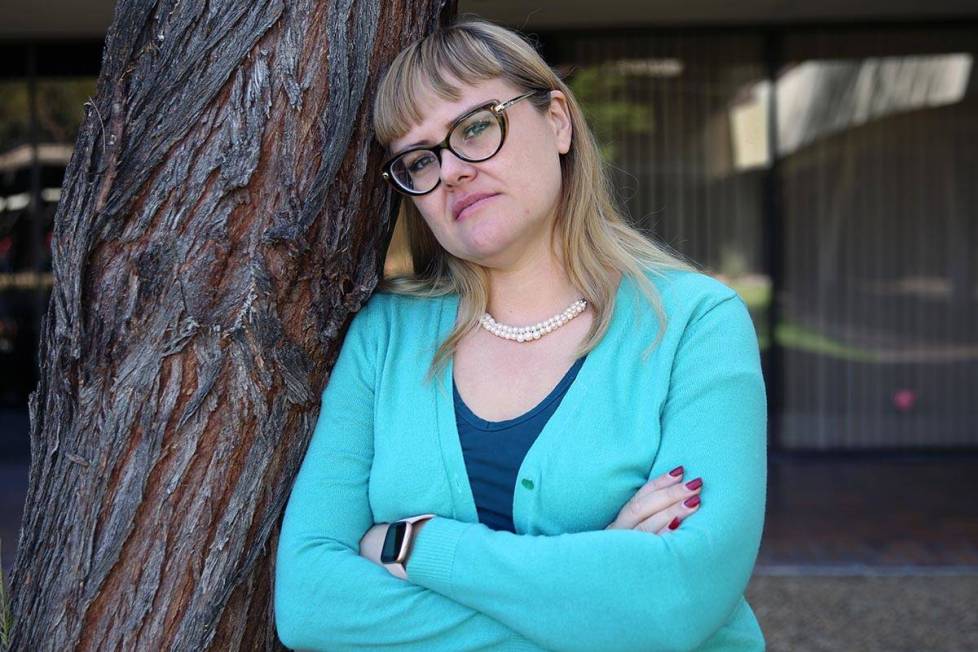Judge vacates convictions of woman who hit, killed 6 teens in 2000

A federal judge has vacated the convictions of Jessica Williams in the deaths of six Las Vegas Valley teens killed in an Interstate 15 median in 2000.
U.S. District Court Judge Kent Dawson partially granted a writ of habeas corpus filed on Williams’ behalf by Las Vegas attorney John Watkins of Pariente Law Firm.
“She is no longer under those convictions,” Watkins said Friday morning. “She is just like you and I at this time.”
The court vacated convictions on six counts of driving with a prohibited substance in the blood. The Clark County District Attorney’s Office has 30 days to decide whether it will retry Williams in the motor vehicle crash that took the lives of Scott Garner Jr., 14; Anthony T. Smith, 14; Jennifer Booth, 16; Alberto Puig, 16; Rebeccah Glicken, 15; and Maleyna Stoltzfus, 15.
The state would then have 120 days to try Williams under Dawson’s order.
Williams was paroled in October after serving approximately 19 years in prison.
“I’ve been fighting this case ever since I had it, and it has finally culminated with Judge Dawson’s elaborate and well-reasoned opinion that Jessica was not given fair notice because of the way the Supreme Court and the District Court instructed as to the prohibited substance,” Watkins said.
Retrial sought
Scott Garner, whose son was killed in the incident, said he was disappointed by the ruling and urged Clark County prosecutors to retry Williams.
“It’s amazing how someone can get away with killing people,” Garner said by phone early Friday, adding he believes Williams should be retried, convicted and “have her finish out her sentence.”
Clark County District Attorney Steve Wolfson could not immediately be reached for comment.
Williams’ case is widely viewed as one of the most devastating pedestrian crashes in Nevada history.
Williams, just 20 at the time, was driving a van that swept across an Interstate 15 median north of Las Vegas and struck the teens. Prosecutors said Williams had marijuana in her system at the time of the crash, earning her a sentence of 18 to 48 years in prison.
Williams, who was 40 as of March, told the Review-Journal in a recent interview that she fell asleep at the wheel and is forever tormented by the suffering her actions caused.
“I never wanted to hurt anybody,” Williams said. “I don’t ever want to cause (the families of the victims) any more pain. I wish I could take everything back. I wish I could undo it all, but I don’t know how. I am so sorry.”
She could not immediately be reached for comment Friday.
The teens were participating in a Clark County youth services program that put them in the middle of a busy interstate. They were picking up trash as restitution for misdemeanors such as curfew violations, theft or shoplifting.
$3.25 million lawsuit settled
The youth work crew was given no safety equipment, and the supervisor of the crew was never given safety instructions to follow. Regulators fined Clark County for ignoring government safety regulations. The county eventually settled a civil lawsuit filed by the victims’ families for more than $3.25 million.
Williams told the newspaper she doesn’t blame the county for the kids being in the interstate. She blames herself for driving tired and falling asleep at the wheel.
“People try to say to me, ‘Well, it was only partially your fault. They shouldn’t have been out there,’ ” Williams said. “Well, I don’t care. That sounds great, and thank you for trying to make me feel better, but it was still my hands on the steering wheel. It doesn’t matter.”
The writ was partially granted on the argument that Williams “was denied due process of law in violation of the Fourteenth Amendment” and that law as written at the time of the crash “did not give fair warning that the presence of an inactive ingredient of marijuana, marijuana metabolite, in her bloodstream, would bring her within the terms of the statutes.”
Watkins said the definition of a prohibited substance in the law Williams was convicted of required “it had to be a Schedule 1 or Schedule 2 drug.”
“The metabolite was not a schedule 1 or schedule 2 drug,” Watkins said. “It was nothing. So we don’t know whether the jury found her guilty of the THC or metabolite.”
Contact Glenn Puit at gpuit@reviewjournal.com. Follow @GlennatRJ on Twitter.